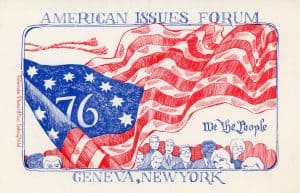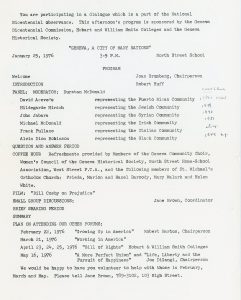American Issues Forum
By Becky Chapin, Archivist
In 1973, Walter Cronkite suggested the idea of an American Issues Forum to take place during America’s Bicentennial year. It would involve a national calendar of topics for discussion during the year, discussing major historical issues that would impact the future of America. Geneva’s Bicentennial Commission created its own local schedule, hosting three forums during 1976 on different topics. I discovered recordings of the first and second forums when we digitized our audio reel collection. The first forum, Geneva, A City of Many Nations, was a panel discussion with six community members moderated by Reverend Durstan McDonald, the HWS Chaplain.
David Acevado, Dr. Hildegard Hirsch, John Jabara, Michael McDonald, Frank Pullano, and Alvin Dion Robinson were the six panelists who were asked about their ethnic/cultural groups, how they arrived in Geneva, and any prejudices they suffered during their time here.
David Acevado was born in the Bronx, spent time in Puerto Rico as a teenager, and came to Geneva to attend Hobart College from where he graduated in 1974. He married a Genevan and became an ESL teacher in the Geneva school district. David said Puerto Ricans started arriving in the area in the 1940s and 1950s, mostly directly from the island as families were contracted by farmers as hired help to pick fruit and vegetables. Others came via the military, worked at the ordinance, or to work in the foundries.
Dr. Hildegard Hirsch was born in Germany to the Jewish culture and faith. She explained that the Jewish community in Geneva started in the 1910s, many came from bigger cities to smaller areas like Geneva and worked as jewelers, in retail, textiles, or as tailors. She and her husband Dr. Erich Hirsch fled Germany during the rise of Adolf Hitler, settling in Italy to study medicine where they obtained their degree. Hildegard realized later that they were lucky to make that detour because when they came to Geneva, many of their first patients were Italian when the hospitals did not want to hire them. When the Hirschs arrived in 1939, there were suspicions because they were foreigners. Eventually, they earned the respect of doctors at the hospital and maintained a private practice.
Alvin Robinson arrived in the Geneva area with the development of the Sampson base in the 1940s . Alvin was in the first group of Black troops that were brought to this area but while the military community accepted them, Black newcomers were not as accepted by the Blacks already in Geneva who had established themselves. He talked about the difficulties in trying to buy a home. Other arrivals to the area came to work on the base but after that, the only jobs available to a person of color were jobs in the foundry, US Radiator, and Patent Cereals. Alvin himself went from having a prominent military position to working as a custodian at Market Basket before moving into administration at the Veterans Administration. After that, he applied at the post office where he hit wall after wall of resistance to the hiring of a Black man at the Geneva Post Office.
Frank Pullano was a native Genevan, but his father had immigrated from Italy at age 11. He spoke to older immigrants who said most who started migrating in the late 1880s came from poorer areas of Italy to work on the railroads, as masons or for farmers and nurserymen, making arrangements for friends and family members to join them. Italians encountered problems because of the color of their skin, a language barrier, and many were illiterate. Problems arose between the Italians and Irish in the Catholic population where the two groups worshiped differently than each other despite sharing the same religion. Frank expressed the belief that as the immigrants’ children started attending the same schools as the Irish, these problems started to disappear. He did say prejudice against Italians was still prevalent because in 1966 when he was looking for a lot to build a house, he was denied because there were too many Italians in the area already.
Michael McDonald immigrated from Ireland in the 1930s so he did not have direct knowledge of when exactly the Irish community started to develop in Geneva. He explained that Geneva was a popular destination because it had so many farms that needed cheap labor. The immigrants would raise larger families whose children educated themselves and began to move into cities. Some became farmers, or worked on railroads, but nearly all of them were politicians of some kind because in Ireland there was so much political persecution that the immigrants enjoyed having the freedom. Michael himself became a policeman in Geneva’s police force.
John Jabara was born in Wilkes Barre, Pennsylvania to Syrian immigrants and was a Geneva police officer for 28 years. He explained that Syrians first came to Albany around 1895, discovered the railroads in Manchester and Geneva were looking for help, and peddled their way to Ithaca, Geneva, and Manchester even though they didn’t speak English. Around the turn of the 20th century, the founders of St. Michael’s Syrian Orthodox Church started arriving in Geneva. These folks started opening their own businesses in dry goods, shoe stores, groceries, ice cream, shoe repair, and worked in farming and various factories.
The second forum was called Growing Up in America and Geneva, but the third forum, Working in America, was not recorded. The two forums will soon be available for listening at New York Heritage in the George Hucker Collection.



Becky,
Thanks for sharing this information. I found it very interesting as I knew most of these folks.